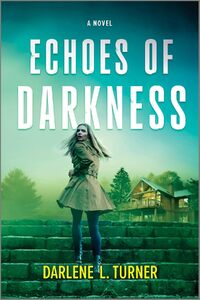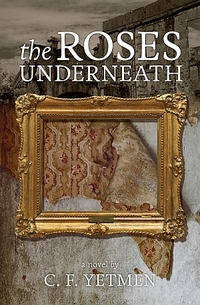 ECHOES OF DARKNESS |
 Fall headfirst into July’s hottest stories—danger, desire, and happily-ever-afters await. |

Purchase
Other Press Fiction, Historical Excerpt of The Roses Underneath by C.F. YetmenEmerging on the Adolfsallee, they turned left toward the Wiesbaden town center, Amalia taking off in a half-skip, half-run. People were out and about, beginning daily tasks of cleaning, clearing rubble, finding food, securing work or just walking the streets in search of something. A line of women—pails in hand—had already formed where the milk truck sometimes appeared. The Allied bombs had been comparatively gentle on Wiesbaden, but that was just a relative notion. Bombs were bombs. Anna watched Amalia jump over holes in the sidewalk, her green dress bouncing in the dust clouds she kicked up. This is the landscape of her childhood, Anna thought. Mountains of rubble and rivers of blood. The girl was only six and had seen so much misery and stomached horrible fear, and Anna worried that more was to come. The war had been over for three months already, but what had replaced it? What were they living in? A sort of provisional purgatory, she thought, with occupiers who had to sort the bad from the good, the guilty from the innocent, the past from the future. We are damned; we unleashed hell on the world. And now we Germans must make good. She thought this every day. But to make amends for monstrosities perpetrated in your name and with your complicity, even if it was coerced? Was it even possible? “Mama, look.” Amalia was pointing at something on the ground and beckoning. As Anna approached, she saw what had caught Amalia’s eye. Gleaming in the sunlight was a large metal button, the kind found on a Loden jacket or a dirndl or some other traditional dress, the kind the Nazis had been so fond of the German Volk wearing. It was heart-shaped and stamped with a scroll pattern. “Can I take it?” whispered Amalia, her eyes beaming as if she had found buried treasure. Which, Anna thought, she had, in a way. “Yes, you may,” said Anna, joining in the spirit. “What a prize.” Amalia picked up the button, now black with grime and held it on her flat palm. “Can we wash it, Mama? So it will shine?” “Yes of course, little Maus,” said Anna. “Now put it in your pocket and keep it safe. We need to hurry.” Amalia slipped her hand into her mother’s and they walked on between the piles of stones that lay like sleeping prehistoric creatures along the street. Anna imagined them hibernating, waiting until they could be reanimated into something new, something hopeful. As they approached the Rheinstrasse, the bustle of the city flowed along the main thoroughfare and the Bonifazius church glowed in the morning sun, Gothic spires flanking its bombed out sanctuary like two sentries. The American MP directing traffic at the intersection whistled and motioned for them to cross. They turned and walked east into the sun, joining the people heading to whatever jobs they were lucky enough to have. Nearing the large, looming Landesmuseum, where the Americans had set up shop, they walked along the newly installed chain-link fence with the barbed wire on top until they came to the guard at the workers’ entry outside the rear courtyard. The sign read U.S. Army Monuments, Fine Art and Archives, and the young soldier standing at the entrance looked as earnest and rigid as a statue himself. Anna sat Amalia down on a bench next to the gate. “Listen to me, Maus.” Anna squatted down. “Do you remember what I said? You wait here until I come out and get you. And what will you say if anyone asks you why you are here?” Amalia exhaled and flatly recited the words: “My name is Amalia Klein. My Mutter ist Anna Klein. She ist in there. I wait for her?” She pointed at the building. “Mother, not Mutter,” said Anna, stroking the blond hair that threatened to escape from Amalia’s braids. “Mother.” “Mother,” said Amalia. She pulled the button from her pocket and studied it with scientific intensity. Anna’s stomach clenched. She wished she had some choice other than leaving her daughter here, on a bench on the sidewalk. But she didn’t. “Look, Maus.” She pointed at the GI. “See that American? I bet he comes from Texas, from the Wild West. Maybe he is the sheriff of his town and he has a big horse and he keeps all the bad guys away. That’s probably why he’s standing guard here now. What do you think?” They stole a glance at the bulldog of a GI. His face was young but worn and tired. His white MP helmet was balanced precariously on his head, which seemed too large for his short, square body. The name on his uniform said Long, which almost made Anna smile. “So he’s going to need your help keeping bad guys out of the museum while Mama goes to work.” Anna turned Amalia to face the three-story building and pointed to the top floor. “Count three windows from the end and that’s where I’ll be. I’ll be watching you all the time while I am doing my job. Your job is to sit quietly here.” “But how long will you take, Mama?” “Not long, only until lunchtime. Do you promise you won’t move? You have Lulu to keep you company.” A pile of trash rained down from an upper window. GIs and German workers dodged the periodic showers of debris, old blankets, mattresses, pieces of wood, and building materials. These were the remnants of the hundreds of displaced people who had sought shelter in the museum at the end of the war. Now it would house the new offices of the Americans they called the Monuments Men. Anna was not altogether sure what their job was, it seemed to have something to do with returning items to people. But they had needed English speakers and typists and to her great good fortune, she was adept at both. Excerpt from The Roses Underneath by C.F. Yetmen |
|
| |||
|
||||




 © 2003-2025
© 2003-2025